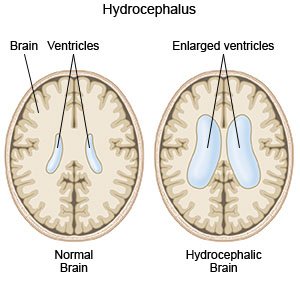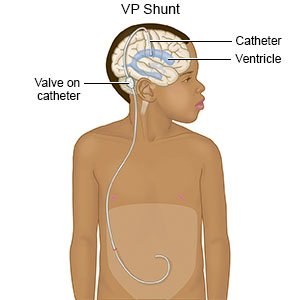Hydrocephalus
Medically reviewed by Drugs.com. Last updated on Aug 4, 2025.
Hydrocephalus is a condition caused by too much cerebrospinal fluid (CSF) inside the ventricles of your brain. Ventricles are spaces inside the brain where cerebrospinal fluid (CSF) is made and held. CSF surrounds and helps cushion your brain and spinal cord. CSF also provides nutrients to your nervous system. CSF is constantly being made and absorbed by your body. CSF moves through ventricles before it drains out and gets absorbed into your bloodstream. When CSF cannot drain properly, the fluid pressure may cause the ventricles to swell.
 |
WHILE YOU ARE HERE:
Informed consent
is a legal document that explains the tests, treatments, or procedures that you may need. Informed consent means you understand what will be done and can make decisions about what you want. You give your permission when you sign the consent form. You can have someone sign this form for you if you are not able to sign it. You have the right to understand your medical care in words you know. Before you sign the consent form, understand the risks and benefits of what will be done. Make sure all your questions are answered.
An IV
is a small tube placed in your vein that is used to give you medicine or liquids.
Neuro signs
, or neuro checks show healthcare providers your brain function. They will check your eye movements and how your pupils react to light. They may check your memory and how easily you wake up. Your strength, balance, vision, and other brain functions may also be tested.
Medicines:
- Steroids help decrease inflammation and lower the amount of CSF your body makes.
- Antibiotics help treat or prevent an infection caused by bacteria.
Tests:
- Blood tests may show infection and inflammation or provide information about your overall health.
- A CT or MRI may show bleeding, extra fluid, stenosis, tumors, or cysts. You may be given contrast liquid to help your brain show up better in the pictures. Tell the healthcare provider if you have ever had an allergic reaction to contrast liquid. Do not enter the MRI room with anything metal. Metal can cause serious injury. Tell the healthcare provider if you have any metal in or on your body.
- A lumbar puncture , or spinal tap, is a procedure to collect a sample of CSF fluid to check for infection or test CSF pressure.
- Lumbar drainage is a procedure used to drain CSF fluid to see if your symptoms get better. Healthcare providers use a needle to insert a catheter (tube) to drain CSF from around your spine for up to 5 days. You must stay in the hospital during this test.
- Intracranial pressure (ICP) monitoring measures the pressure inside your skull. A small tube is put through your skull. The other end is connected to a monitor.
- Cisternography is a test to watch how CSF moves through your brain and spinal canal. The test takes 1 to 3 days.
Treatment:
- Tumor or cyst removal may help relieve a blockage and improve your symptoms.
- Shunt placement helps drain extra CSF fluid through a tube from your brain into your abdomen where it is absorbed.

- Ventriculostomy helps drain the extra CSF fluid through a small hole in your brain.
Treatment options
The following list of medications are related to or used in the treatment of this condition.
RISKS:
Without treatment, symptoms such as headaches, vision problems, or seizures may become worse. You may develop incontinence (leaking urine). Your ability to think clearly may get worse. Over time, the pressure on your brain caused by hydrocephalus may be life-threatening.
CARE AGREEMENT:
You have the right to help plan your care. Learn about your health condition and how it may be treated. Discuss treatment options with your healthcare providers to decide what care you want to receive. You always have the right to refuse treatment.© Copyright Merative 2025 Information is for End User's use only and may not be sold, redistributed or otherwise used for commercial purposes.
The above information is an educational aid only. It is not intended as medical advice for individual conditions or treatments. Talk to your doctor, nurse or pharmacist before following any medical regimen to see if it is safe and effective for you.
Learn more about Hydrocephalus
Treatment options
- Medications for Brain Anomalies incl Congenital
- Medications for Central Nervous System Disorders
- Medications for Hydrocephalus
Care guides
Symptoms and treatments
Further information
Always consult your healthcare provider to ensure the information displayed on this page applies to your personal circumstances.
